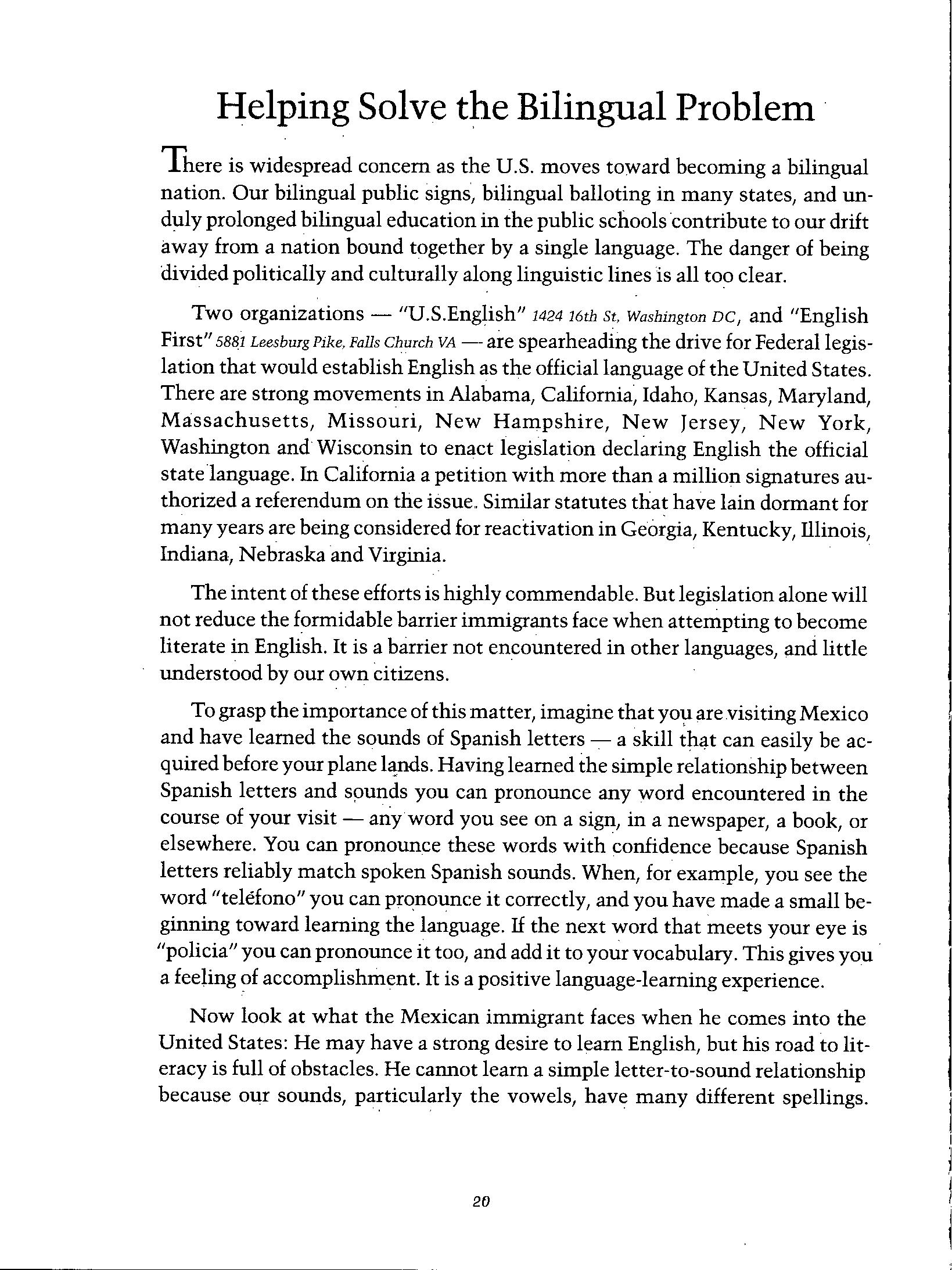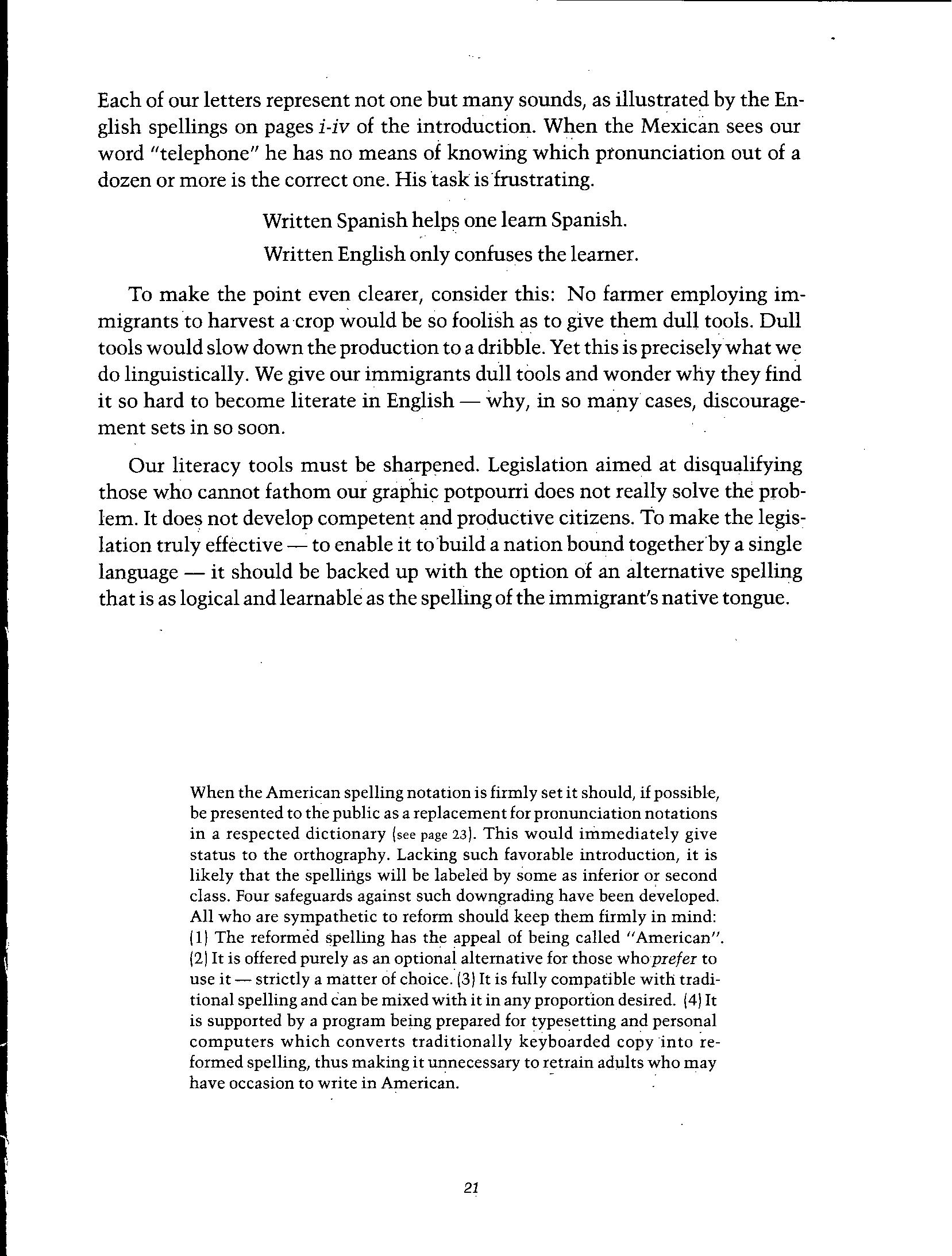
4 minute read
A FORECAST OF THE EFFECTIVENESS OF AMERICAN SPELLING, 16 IMPLEMENTING SPELLING REFORM, 18 HELPING SOLVE THE BILINGUAL PROBLEM
Helping Solve the Bilingual Problem
There is widespread concern as the U.S. moves toward becoming a bilingual nation. Our bilingual public signs, bilingual balloting in many states, and unduly prolonged bilingual education in the public schools contribute to our drift away from a nation bound together by a single language. The danger of being divided politically and culturally along linguistic lines is all too clear.
Advertisement
Two organizations - "U.S.English" 1424 16th St, Washington DC, and "English First" 5881 Leesburg Pike, Fails Church VA -- are spearheading the drive for Federal legislation that would establish English as the official language of the United States. There are strong movements in Alabama, California, Idaho, Kansas, Maryland, Massachusetts, Missouri, New Hampshire, New Jersey, New York, Washington and Wisconsin to enact legislation declaring English the official state language. In California a petition with more than a million signatures authorized a referendum on the issue,. Similar statutes that have lain dormant for many years are being considered for reactivation in Georgia, Kentucky, Illinois, Indiana, Nebraska and Virginia.
The intent of these efforts is highly commendable. But legislation alone will not reduce the formidable barrier immigrants face when attempting to become literate in English. It is a barrier not encountered in other languages, and little understood by our own citizens.
To grasp the importance of this matter, imagine that you are visiting Mexico and have learned the sounds of Spanish letters - a skill that can easily be acquired before your plane lands. Having learned the simple relationship between Spanish letters and sounds you can pronounce any word encountered in the course of your visit - any word you see on a sign, in a newspaper, a book, or elsewhere. You can pronounce these words with confidence because Spanish letters reliably match spoken Spanish sounds. When, for example, you see the word "telefono" you can pronounce it correctly, and you have made a small beginning toward learning the language. If the next word that meets your eye is "policia" you can pronounce it too, and add it to your vocabulary. This gives you a feeling of accomplishment. It is a positive language-learning experience.
Now look at what the Mexican immigrant faces when he comes into the United States: He may have a strong desire to learn English, but his road to literacy is full of obstacles. He cannot learn a simple letter-to-sound relationship because our sounds, particularly the vowels, have many different spellings.
Each of our letters represent not one but many sounds, as illustrated by the English spellings on pages i-iv of the introduction. When the Mexican sees our word "telephone" he has no means of knowing which pronunciation out of a dozen or more is the correct one. His task is frustrating. Written Spanish helps one learn Spanish. Written English only confuses the learner.
To make the point even clearer, consider this: No farmer employing immigrants to harvest a crop would be so foolish as to give them dull tools. Dull tools would slow down the production to a dribble. Yet this is precisely what we do linguistically. We give our immigrants dull tools and wonder why they find it so hard to become literate in English - 'why, in so many cases, discouragement sets in so soon.
Our literacy tools must be sharpened. Legislation aimed at disqualifying those who cannot fathom our graphic potpourri does not really solve the problem. It does not develop competent and productive citizens. to make the legislation truly effective - to enable it to build a nation bound together by a single language - it should be backed up with the option of an alternative spelling that is as logical and learnable as the spelling of the immigrant's native tongue.
When the American spelling notation is firmly set it should, if possible, be presented to the public as a replacement for pronunciation notations in a respected dictionary (see page 23). This would immediately give status to the orthography. Lacking such favorable introduction, it is likely that the spellings will be labeled by some as inferior or second class. Four safeguards against such downgrading have been developed. All who are sympathetic to reform should keep them firmly in mind: (1) The reformd spelling has the appeal of being called "American". (21 It is offered purely as an optional alternative for those whoprefer to use it - strictly a matter of choice. (3) It is fully compatible with traditional spelling and can be mixed with it in any proportion desired. (4) It is supported by a program being prepared for typesetting and personal computers which converts traditionally keyboarded copy into reformed spelling, thus making it unnecessary to retrain adults who may have occasion to write in American. -





